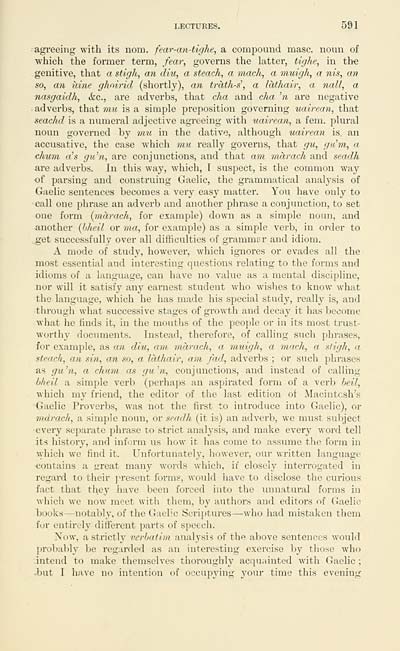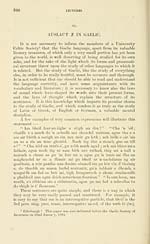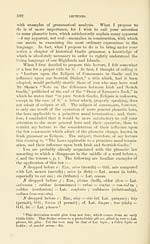Ossian Collection > Reliquiae Celticae > Volume 2
(605)
Download files
Complete book:
Individual page:
Thumbnail gallery: Grid view | List view

LECTURES. 591
agreeing with its nom. fear-an-tighe, a compound masc. nonu of
which the former term, fear, governs the latter, tighe, in the
genitive, that a stigh, an diu, a steach, a mack, a muigh, a nis, an
so, an iiine ghnirid (shortly), an tràth-s\ a làthair, a nail, a
nasgaidh, &c., are adverbs, that cha and cha ^n are negative
■ adverbs, that nuo is a simple preposition governing uairean, that
seachd is a numeral adjective agreeing with uairean, a fern, plural
noun governed by mu in the dative, although uairean is. an
accusative, the case which mu really governs, that gu, giim, a
chum a's gu'n, are conjunctions, and that a7)i màrach and seadh
are adverbs. In this way, which, I suspect, is the common way
of parsing and construing Gaelic, the grammatical analysis of
Gaelic sentences becomes a very easy matter. You have only to
call one phrase an adverb and another phrase a conjunction, to set
one form (màì-ach, for example) down as a simple noun, and
another (bheil or 7na, for example) as a simple verb, in order to
get successfully over all difficulties of grammor and idiom.
A mode of study, however, which ignores or evades all the
most essential and interesting questions relating to the forms and
idioms of a language, can have no value as a mental discipline,
nor will it satisfy any earnest student who wishes to know what
the language, which he has made his special study, really is, and
through what successive stages of growth and decay it has become
what he finds it, in the mouths of the people or in its most tru&t-
wortlw documents. Instead, therefore, of calling such phrases,
for example, as an diu, am màrach, a muigh, a mach, a stigh, a
steach, an sin, an so, a làthair, am fad, adverbs ; or such phrases
as gu'n, a chum as gu'n, conjunctions, and instead of calling
b/ieil a simple verb (perhaps an aspirated form of a verb beil,
which my friend, the editor of the last edition of Macintosh's
Gaelic Proverbs, was not the first to introduce into Gaelic), or
mdrac/i, a simple noun, or seadh (it is) an adverb, we must subject
every separate phrase to strict analysis, and make every word tell
its history, and inform us how it has come to assume the form in
which we find it. Unfortunately, however, our written language
contains a yreat many words which, it closely interrogated in
regard to their present forms, would have to disclose the curious
fact that they have been forced into the imnatural forms in
which we now meet with them, by authors and editors of Gaelic
books — notably, of the Gaelic Scriptures — who had mistaken them
for entirely different parts of speech.
Now, a strictly verbatim analysis of the above sentences would
probably be regarded as an interesting exercise by those who
intend to make themselves thoroughly acquainted with Gaelic ;
.but I have no intention of occupying your time this evening
agreeing with its nom. fear-an-tighe, a compound masc. nonu of
which the former term, fear, governs the latter, tighe, in the
genitive, that a stigh, an diu, a steach, a mack, a muigh, a nis, an
so, an iiine ghnirid (shortly), an tràth-s\ a làthair, a nail, a
nasgaidh, &c., are adverbs, that cha and cha ^n are negative
■ adverbs, that nuo is a simple preposition governing uairean, that
seachd is a numeral adjective agreeing with uairean, a fern, plural
noun governed by mu in the dative, although uairean is. an
accusative, the case which mu really governs, that gu, giim, a
chum a's gu'n, are conjunctions, and that a7)i màrach and seadh
are adverbs. In this way, which, I suspect, is the common way
of parsing and construing Gaelic, the grammatical analysis of
Gaelic sentences becomes a very easy matter. You have only to
call one phrase an adverb and another phrase a conjunction, to set
one form (màì-ach, for example) down as a simple noun, and
another (bheil or 7na, for example) as a simple verb, in order to
get successfully over all difficulties of grammor and idiom.
A mode of study, however, which ignores or evades all the
most essential and interesting questions relating to the forms and
idioms of a language, can have no value as a mental discipline,
nor will it satisfy any earnest student who wishes to know what
the language, which he has made his special study, really is, and
through what successive stages of growth and decay it has become
what he finds it, in the mouths of the people or in its most tru&t-
wortlw documents. Instead, therefore, of calling such phrases,
for example, as an diu, am màrach, a muigh, a mach, a stigh, a
steach, an sin, an so, a làthair, am fad, adverbs ; or such phrases
as gu'n, a chum as gu'n, conjunctions, and instead of calling
b/ieil a simple verb (perhaps an aspirated form of a verb beil,
which my friend, the editor of the last edition of Macintosh's
Gaelic Proverbs, was not the first to introduce into Gaelic), or
mdrac/i, a simple noun, or seadh (it is) an adverb, we must subject
every separate phrase to strict analysis, and make every word tell
its history, and inform us how it has come to assume the form in
which we find it. Unfortunately, however, our written language
contains a yreat many words which, it closely interrogated in
regard to their present forms, would have to disclose the curious
fact that they have been forced into the imnatural forms in
which we now meet with them, by authors and editors of Gaelic
books — notably, of the Gaelic Scriptures — who had mistaken them
for entirely different parts of speech.
Now, a strictly verbatim analysis of the above sentences would
probably be regarded as an interesting exercise by those who
intend to make themselves thoroughly acquainted with Gaelic ;
.but I have no intention of occupying your time this evening
Set display mode to: Large image | Transcription
Images and transcriptions on this page, including medium image downloads, may be used under the Creative Commons Attribution 4.0 International Licence unless otherwise stated. ![]()
| Early Gaelic Book Collections > Ossian Collection > Reliquiae Celticae > Volume 2 > (605) |
|---|
| Permanent URL | https://digital.nls.uk/81694046 |
|---|
| Description | Vol. II. |
|---|---|
| Shelfmark | Oss.288 |
| Attribution and copyright: |
|
| Description | Selected books from the Ossian Collection of 327 volumes, originally assembled by J. Norman Methven of Perth. Different editions and translations of James MacPherson's epic poem 'Ossian', some with a map of the 'Kingdom of Connor'. Also secondary material relating to Ossianic poetry and the Ossian controversy. |
|---|
| Description | Selected items from five 'Special and Named Printed Collections'. Includes books in Gaelic and other Celtic languages, works about the Gaels, their languages, literature, culture and history. |
|---|

